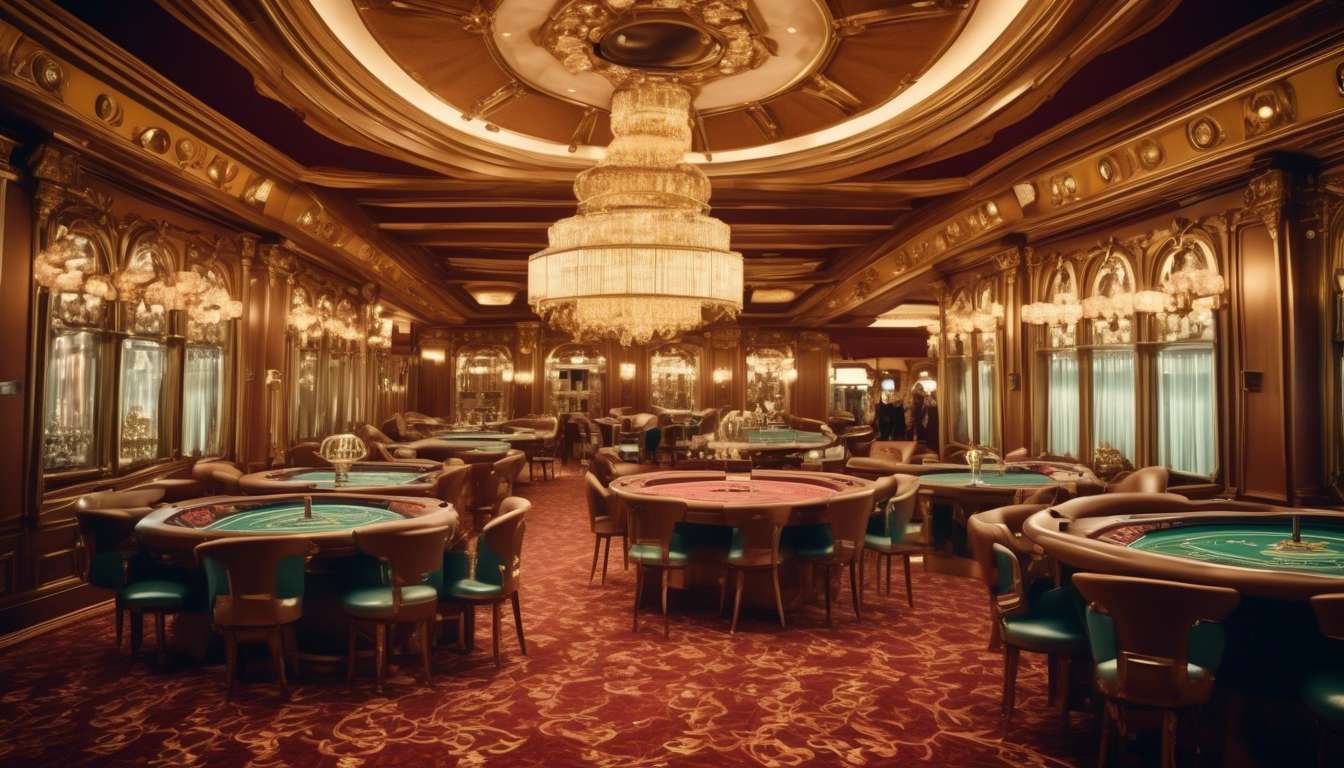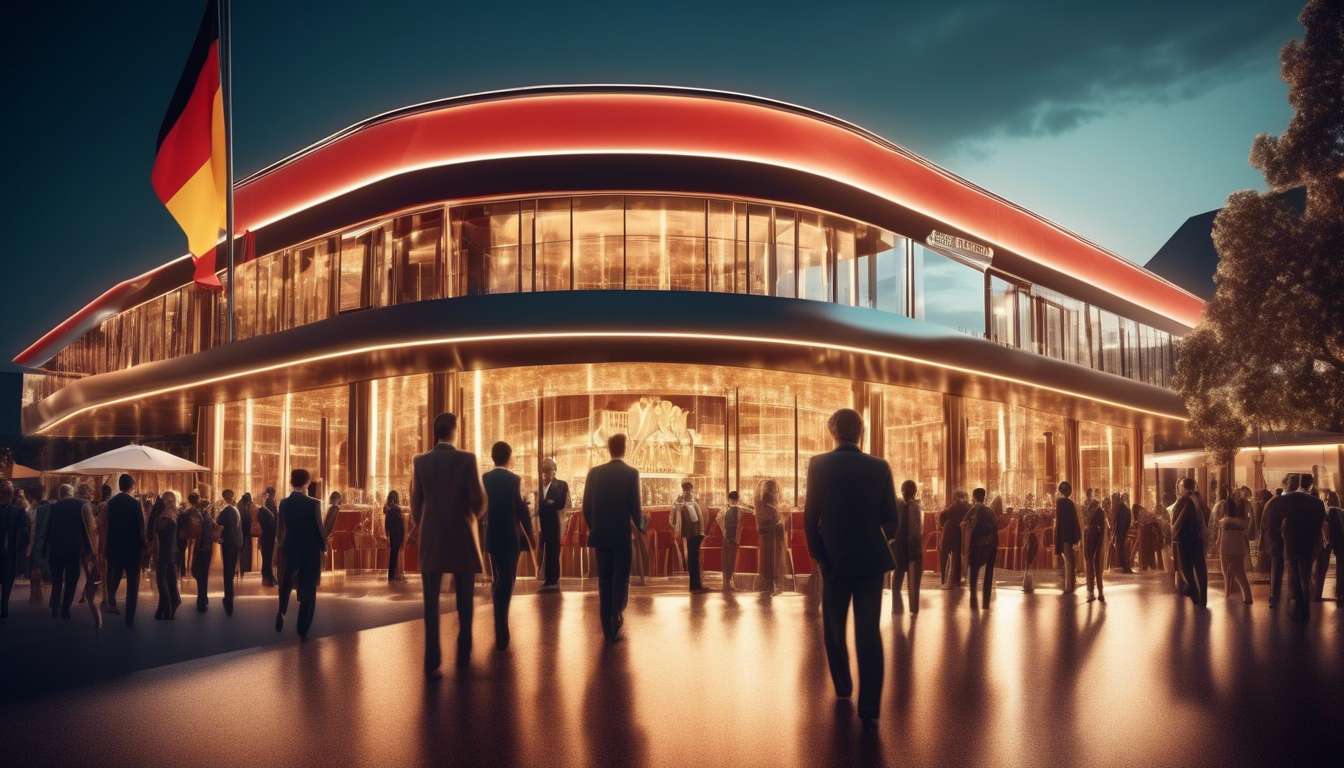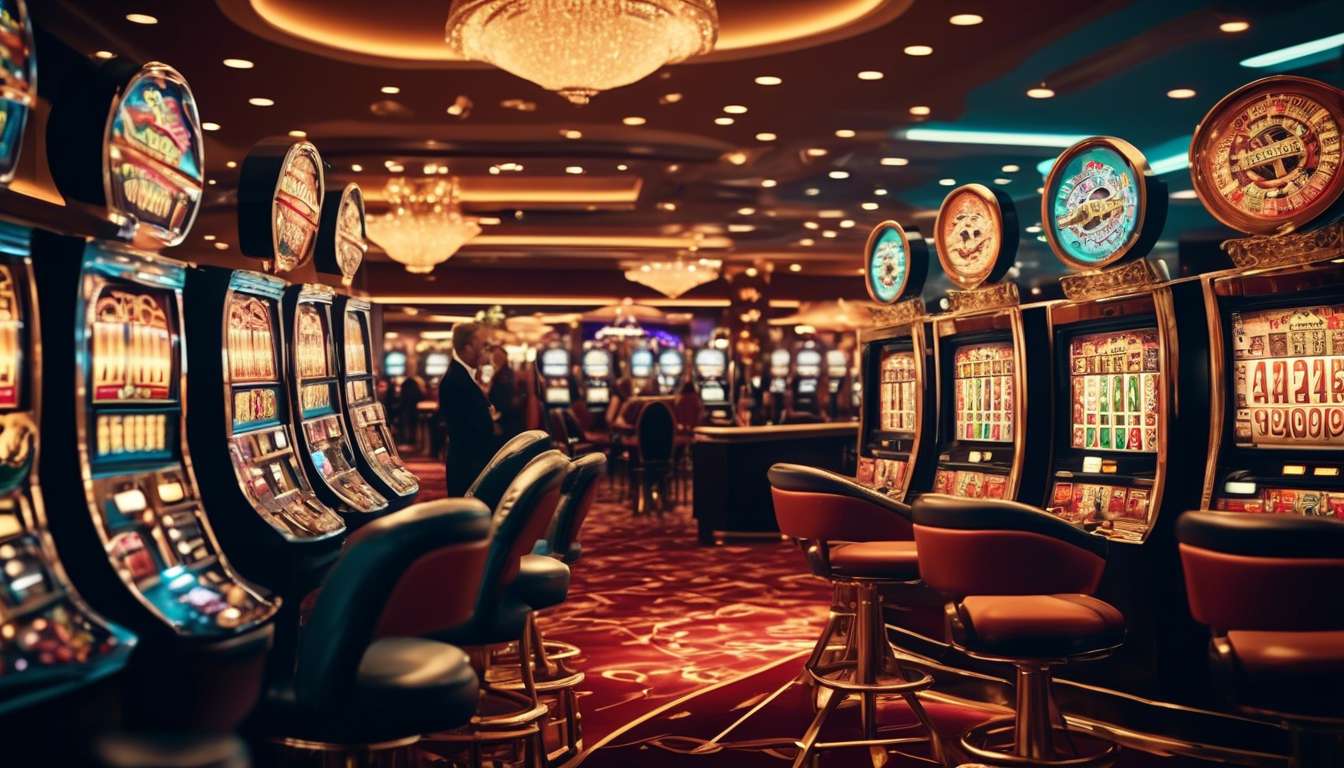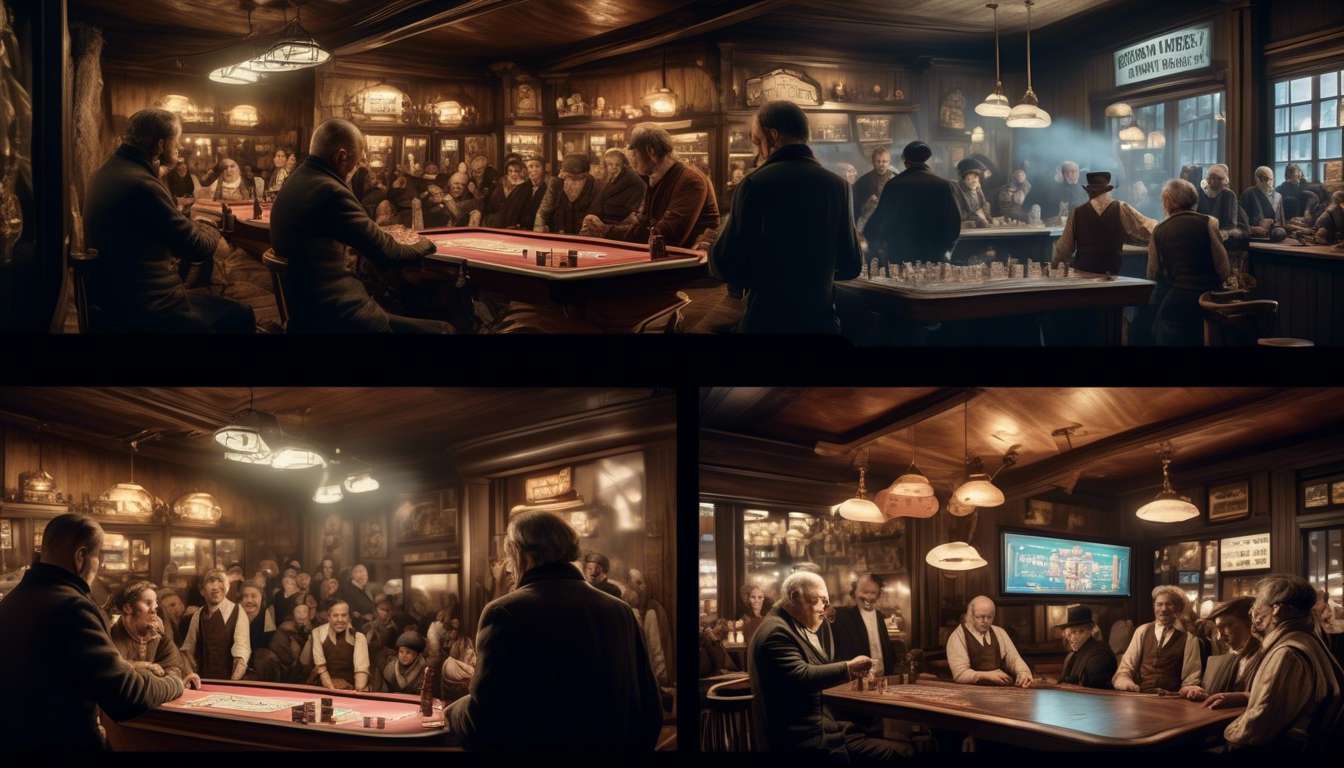Germany’s Gambling Legacy
When we think of casinos, our minds often drift to the glitz and glamour of Las Vegas or the historic elegance of Monte Carlo. However, Germany has its own intriguing and lesser-known legacy in this domain. Let’s explore five surprising facts about German casino history that will enlighten us and reshape our perception of this fascinating topic.
1. The Opulent Halls of the Kurhaus in Baden-Baden
The Kurhaus in Baden-Baden is one of Germany’s most famous casinos, renowned for its opulent architecture and rich history.
- This grand establishment has attracted the elite from across Europe for centuries, offering a luxurious gaming experience amidst stunning surroundings.
2. Unexpected Legislative Shifts
Germany’s gambling history is marked by significant legislative shifts that have influenced the landscape of gaming establishments.
- At various points, gambling was banned and subsequently reinstated, reflecting changing societal attitudes and government policies.
3. Cultural Nuances in Gambling
Gambling in Germany is intertwined with cultural nuances that differentiate it from other countries.
- The German approach to gaming is often characterized by a focus on skill-based games rather than pure chance, reflecting a cultural appreciation for strategy and intellect.
4. The Evolution of Modern Gaming Establishments
The historical elements of German gambling have shaped modern gaming establishments in the country.
- Many casinos today offer a unique blend of tradition and innovation, preserving historical charm while incorporating modern amenities and technology.
5. Stories That Astonish and Educate
As we delve into Germany’s gambling past, we uncover stories filled with captivating tales and unexpected turns.
- These narratives not only astonish but also educate us about the complex interplay of history, culture, and gaming in Germany.
Join us as we embark on this exploration, unveiling stories that promise to astonish and educate us all. Germany’s gambling past is a rich tapestry that continues to influence and inspire the world of gaming today.
The Opulence of Kurhaus in Baden-Baden
Among the grand establishments of Germany, the Kurhaus in Baden-Baden stands as a symbol of opulence and history. We’re drawn to this majestic venue not just for its stunning architecture but also for its significant cultural impact.
The Kurhaus has long been a gathering place for those seeking entertainment and a sense of community. It’s where people from all walks of life have come together, united by the allure of chance and fortune.
Our fascination with the Kurhaus is deeply intertwined with the evolution of gambling laws in the region. These laws shaped the casino’s operations and its role in society, reflecting broader cultural shifts. The Kurhaus embodies a unique blend of indulgence and regulation, showcasing how gambling can coexist with cultural refinement.
As we walk through its elegant halls, we feel connected to history, sensing the whispers of past patrons who reveled in its charm. The Kurhaus isn’t just a building; it’s a testament to our shared love for history and leisure.
Legislative Shifts in Gambling Laws
Throughout the years, we’ve witnessed numerous legislative shifts that have profoundly influenced the landscape of gambling in Germany. These changes have not only shaped the industry but also solidified a sense of community among those who partake in this age-old pastime.
By revisiting these shifts, we feel more connected to a shared history marked by both restriction and liberation.
The iconic Kurhaus in Baden-Baden stands as a testament to the evolving gambling laws that have characterized Germany’s approach to gaming.
- Initially, the Kurhaus thrived under liberal regulations, drawing visitors from all over Europe.
- However, with the introduction of stricter gambling laws, its doors temporarily closed, reflecting the cultural impact of these legislative changes.
Each shift in law has left its mark, creating ripples through the communities that gather at such historic venues.
By understanding these shifts, we see how legislation has not only regulated but also nurtured a unique cultural identity within the German gambling scene.
Cultural Nuances in German Gambling
German Gambling Culture and History
German gambling culture is deeply intertwined with its rich history and unique regional traditions. This is evident in the iconic Kurhaus casinos, which serve as more than just places to gamble. These elegant venues are cultural landmarks, reflecting the architectural beauty and social traditions of their regions.
- The Kurhaus in Baden-Baden, for example, isn’t just about high-stakes games; it’s about experiencing a piece of history while engaging in refined leisure activities.
Gambling Laws and Cultural Norms
Our gambling laws play a significant role in shaping our cultural norms around betting. They are more than regulations; they’re a testament to our society’s values, balancing entertainment with responsibility. These laws impact how we view gambling by emphasizing:
- Moderation
- Community welfare
Social and Cultural Impact
The cultural impact of gambling in Germany extends beyond the gaming tables. It is a social activity that fosters connections and shared experiences, creating a sense of belonging. Whether at a grand Kurhaus or a local venue, gambling in Germany is about:
- Camaraderie
- Cultural celebration
Influence on Modern Gaming Establishments
Modern gaming establishments in Germany have evolved by incorporating elements of elegance and cultural significance from historical venues like the Kurhaus. We’ve embraced the grandeur and sophistication that these iconic places exemplified, creating spaces where tradition meets modernity. It’s not just about gaming; it’s about experiencing a rich cultural legacy that makes us feel connected to our past.
Our current gambling laws have shaped these establishments, ensuring they remain places of responsible entertainment. By respecting these regulations, our casinos become more than just venues for chance; they’re safe havens for social interaction and community.
This careful balance between regulation and recreation highlights the cultural impact of our gaming spaces.
We’ve seen how the charm of the Kurhaus influences modern architecture and interior design, inviting us into environments that are both luxurious and welcoming. As we step into these establishments, we’re not just players; we’re part of a tradition that values elegance, responsibility, and belonging.
Captivating Stories from German Casinos
Throughout the years, we’ve encountered countless fascinating tales that paint a vivid picture of the vibrant and intriguing life within Germany’s casinos.
The Kurhaus in Baden-Baden, with its opulent halls, stands as a testament to the grandeur and allure of German gambling culture. It’s more than just a building; it’s a cultural icon that has witnessed the evolution of gambling laws and their profound impact on society.
Stories of fortunes won and lost echo through its corridors, each tale intertwining with the history of Germany itself. When we walk through these casinos, we feel the pulse of an ever-changing cultural landscape, shaped by the ebb and flow of legislation and societal norms.
The way these venues have adapted over time highlights their resilience and cultural significance. We, as a community, find ourselves drawn to these stories, seeking connection and understanding of a shared past that continues to influence our present and future.
Notable Figures in German Casino History
Throughout German casino history, several influential figures have shaped the landscape of gambling with their innovative ideas and bold ventures.
Friedrich Weinbrenner is one such figure. As the architect behind the iconic Kurhaus in Baden-Baden, his architectural masterpiece did more than host lavish activities; it became a symbol of Germany’s rich cultural impact on gambling. By creating a space that combined elegance with entertainment, Weinbrenner helped elevate the casino experience to new heights.
Otto von Bismarck is another key figure whose influence on gambling laws helped shape the legal framework we know today. Bismarck’s pragmatic approach ensured that gambling remained a viable and regulated part of the German economy, appealing to those who appreciate structure and order within shared spaces.
By understanding and recognizing these pivotal contributions, we find a sense of belonging and pride in the rich tapestry of German casino history. Together, these individuals have left an indelible mark on our cultural and gambling landscape.
Technological Advancements in German Casinos
In recent years, we’ve witnessed remarkable technological advancements that have revolutionized the way casinos operate in Germany.
The historic Kurhaus, a symbol of elegance and tradition, now embraces cutting-edge technology to enhance the gaming experience for all of us. From digital poker tables to virtual reality slots, these innovations make our visits more interactive and engaging, while still respecting the cultural heritage we cherish.
German gambling laws have adapted to keep pace with these changes, ensuring a safe and fair environment for everyone involved. Key developments include:
- Introduction of sophisticated security systems
- Real-time monitoring to protect both players and establishments
These advancements foster trust among us, creating a sense of belonging in this vibrant community.
Moreover, the cultural impact of these innovations is significant. As technology bridges the gap between tradition and modernity, we find ourselves part of a dynamic evolution where everyone feels included.
Together, we celebrate this new era of German casino history.
Impact of German Casino Culture Today
Today, we see German casino culture shaping both local and international perceptions of entertainment and leisure.
The Kurhaus in Baden-Baden, a symbol of elegance and sophistication, attracts visitors from all over the world, showcasing Germany’s rich tradition in casino excellence. Its grandeur not only highlights our cultural impact but also invites a sense of belonging for those who cherish refined experiences.
Germany’s stringent gambling laws have played a crucial role in molding the casino landscape.
By prioritizing responsible gaming and fair play, we create an environment where patrons feel secure and valued. This commitment to integrity has set a benchmark for other countries, ensuring that casinos remain a trusted source of entertainment.
As we embrace these values, the cultural impact of German casinos extends beyond our borders.
We foster connections among diverse groups, uniting people through shared experiences and the thrill of the game. In doing so, we continue to influence global perceptions of what casino culture can and should be.
What are some unique architectural features of German casinos outside of Kurhaus in Baden-Baden?
When exploring German casinos beyond the Kurhaus in Baden-Baden, we encounter unique architectural elements that captivate visitors.
Architectural Styles:
- Sleek modern designs
- Opulent historic buildings
Each casino showcases its own distinctive style, adding diversity to the casino experience.
Common Features:
- Ornate ceilings
- Intricate chandeliers
- Grand staircases
These elements significantly contribute to the allure of these gambling establishments.
The attention to detail in the architecture truly enhances the overall experience of visiting a German casino, making each visit memorable.
How did ancient Germanic tribes engage in games of chance or gambling activities?
Ancient Germanic tribes engaged in games of chance and gambling activities through various methods such as:
- Dice
- Board games
- Animal races
These activities were more than mere entertainment; they held significant cultural importance.
Gambling served as a means for communities to:
- Come together
- Bond
- Showcase skills
It’s fascinating to observe how these ancient traditions have influenced modern gaming practices and the casino industry today.
What role did German casinos play during significant historical events like World War II?
During significant historical events like World War II, German casinos played a pivotal role in the economy and social life.
They served as hubs for:
- Entertainment
- Espionage
- Networking among influential figures
Despite the turmoil of the war, these establishments continued to thrive and attract diverse crowds.
The allure of the casinos provided a temporary escape from the harsh realities of the time, offering a glimpse of glamour and excitement amidst chaos.
Conclusion
In conclusion, German casino history is a rich tapestry of opulence, legislative shifts, cultural nuances, and technological advancements.
From the grandeur of Kurhaus in Baden-Baden to the influence on modern gaming establishments, the stories and figures from German casinos continue to captivate.
The impact of German casino culture is felt even today, showcasing a legacy that blends tradition with innovation.




